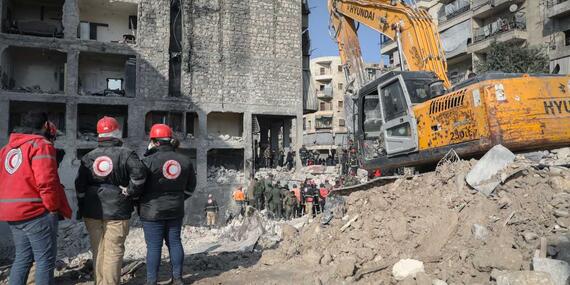Today's top news: Türkiye and Syria

Syria and Türkiye
Earlier today, the UN launched a US$400 million funding appeal to support millions of people affected by the earthquake for the next three months.
The appeal aims to support 4.9 million people with the provision of essential shelter, health, food, water, sanitation, non-food items, education, nutrition and protection services.
It will also help carrying out essential light repairs and rehabilitation to restore health, water and sanitation, agriculture and education infrastructure and supply chains as well as providing protection services, mental health and psychosocial support.
Nearly 9 million people have been affected across the country. The damage is worst in the northwest with more than 4 million people affected in Aleppo and three million in Idlib.
The humanitarian needs in Syria were already at their highest level since the conflict started almost 12 years ago and logistical and access constraints and winter conditions are compounding challenges.
Humanitarian update:
The UN continues to mobilize emergency teams and relief operations in Syria and Türkiye.
Humanitarian efforts are being rapidly scaled up and more assessments are being planned to identify priority needs, such as heavy machinery for debris removal; medical supplies; shelter and other items, including heating; emergency food and sanitation assistance.
Cross-border assistance continues. Following the authorization from the Government of Syria for the UN to use the crossing points of Bab al-Salam and Al Ra’ee, the first UN convoy of 11 trucks from the International Organization for Migration transporting non-food items crossed into north-west Syria today through Bab al-Salam. In addition, 26 trucks with supplies from the UN Office of the High Commissioner for Refugees (UNHCR), the UN Organization for Migration and the World Health Organization (WHO) crossed through Bab Al-Hawa.
In Syria, WHO airlifted 37 tons of emergency medical supplies today which can cover 400,000 treatment and 65,000 trauma cases. This is the second WHO airlift, with the first having arrived on 11 February.
In Aleppo, UNICEF is providing drinking water through emergency water, trucking to about 60,000 internally displaced persons (IDP) in shelters and affected neighbourhoods.
The World Food Programme and its partners have so far supported 60,000 beneficiaries with hot meals, ready to eat packages in Aleppo, Latakia, Tartous and Hama.
Education partners are supporting the Ministry of Education for damaged schools in Aleppo, Hama, Homs and Latakia.
Around 70,000 people have benefited from protection services since the beginning of the emergency, and ten active child protection centres and 15 mobile teams are active.
In north-west Syria, the response capacity continues to be worrying. Partners have conducted rubble removal. UNHCR has distributed 900 tents. The International Organization for Migration has also distributed over 1,150 tents and 1,700 non-food items kits which were pre-positioned in north-west Syria prior to the earthquakes.
At least 20 reception centres have been set up in both the Idleb and Aleppo governorates. Partners working on food security have helped 142,000 people with ready-to-eat food, and some 50,000 people have received cash grants.
In Türkiye, the UNHCR is supporting the relief efforts of the Government of Türkiye. They have supplied emergency shelter materials, blankets, hygiene and kitchen items, and solar lamps. So far, UNHCR has provided 9,000 kitchen sets, 3,000 hygiene kits, 3,000 sanitizers, over 2,100 foam mattresses and 3,300 blankets to temporary accommodation centers in Kahramanmaraş, Gaziantep, Osmaniye, Malatya, Kilis and Hatay. More tents and winter kits from UNHCR’s global stocks are also being deployed.
